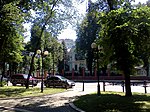Prosecutor's office of the Autonomous Republic of Crimea
Judiciary of UkrainePolitics of Crimea

The Prosecutor's office of the Autonomous Republic of Crimea - is a State Government Body. According to the Constitution and the Ukrainian Law, its functions at the Autonomous Republic of Crimea are prosecution, representation, supervision and control. According to the Acting Prosecutor General's decree No33 dated June 12, 2014, the Prosecutor's office of the Autonomous Republic of Crimea was temporarily relocated to Kyiv.
Excerpt from the Wikipedia article Prosecutor's office of the Autonomous Republic of Crimea (License: CC BY-SA 3.0, Authors, Images).Prosecutor's office of the Autonomous Republic of Crimea
Riznytska Street, Kyiv Pechersk
Geographical coordinates (GPS) Address Nearby Places Show on map
Geographical coordinates (GPS)
| Latitude | Longitude |
|---|---|
| N 50.4354457 ° | E 30.54195799 ° |
Address
Генеральна прокуратура України
Riznytska Street 13/15
01016 Kyiv, Pechersk
Ukraine
Open on Google Maps










